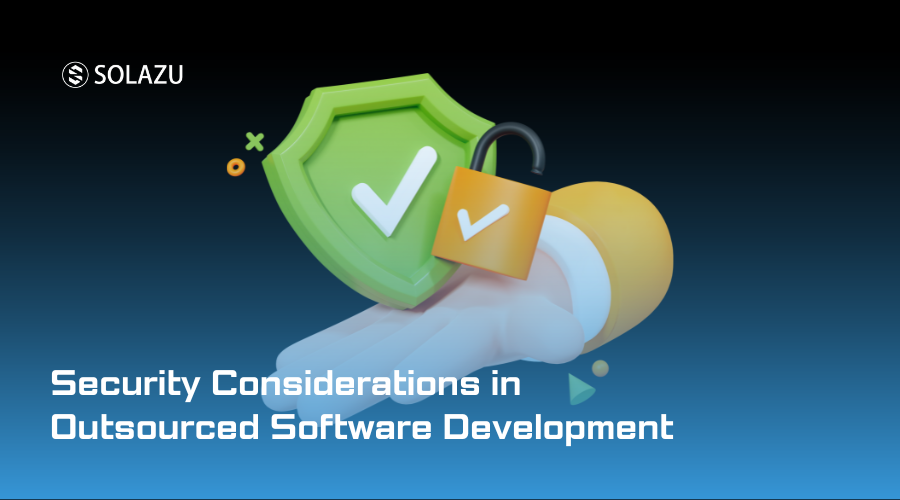Outsourcing software development is a prevalent strategy for businesses looking to accelerate growth, access specialized skills, or reduce costs. However, entrusting another company with your software development also comes with significant security risks that, if not properly managed, could compromise sensitive data, violate compliance requirements, and ultimately tarnish a company’s reputation. In this article, we delve into the crucial aspects of cybersecurity in software development outsourcing. We’ll explore the importance of data protection measures, secure coding practices, and compliance with industry regulations, offering a comprehensive guide to maintaining security in outsourced projects.
The Landscape of Outsourced Software Development
Outsourcing software development often involves multiple facets, including application development, system management, and IT support, which are executed in diverse geographical locations by third-party service providers. The benefits are plentiful, including cost reduction, enhanced efficiency, and access to a global talent pool. Yet, this arrangement inherently increases vulnerability to cyber threats. Data breaches, loss of intellectual property, and unauthorized access to confidential information can occur if security measures are not robust.
Key Security Risks in Outsourcing
The primary security risks associated with outsourcing software development include:
- Data breaches: When sensitive company data is accessible to an external party, the risk of data breaches escalates.
- Intellectual property theft: Sharing details about software processes or designs can lead to unauthorized sharing of intellectual property.
- Compliance violations: Different countries have varying data protection regulations, and non-compliance can lead to significant penalties.
- Lack of control: Relying on a third-party can result in a reduced ability to oversee and manage how data is handled and protected.
Data Protection Measures
Effective data protection is the cornerstone of secure outsourcing arrangements. Here are several strategies to ensure data security:
- Data Encryption: Encrypting data both in transit and at rest can prevent unauthorized access. Using strong encryption protocols ensures that data intercepted during transmission remains unreadable.
- Access Controls: Implement strict access controls based on the principle of least privilege (POLP). Access should be given only to those who need it to perform their job functions.
- Data Masking and Tokenization: These techniques can protect sensitive data by obscuring it, ensuring that outsourced developers do not have access to real data but can still perform their tasks effectively.
- Regular Audits: Conduct regular security audits and vulnerability assessments to identify and address potential security gaps in the outsourced development process.
Secure Coding Practices
Secure coding practices are essential to minimize vulnerabilities in the software development life cycle. Outsourced teams should adhere to the following practices:
- Security Training: Regular training sessions for developers on the latest security practices and common vulnerabilities (like SQL injections, cross-site scripting, etc.) are crucial.
- Code Reviews: Implementing a rigorous code review process helps detect security flaws before the software is deployed.
- Static and Dynamic Analysis Tools: Use automated tools to examine the code in both non-runtime and runtime environments to find vulnerabilities that might be exploited by attackers.
Compliance with Industry Regulations
Adherence to regulatory standards and guidelines is critical in outsourcing, particularly for industries such as finance, healthcare, and retail, which handle a large amount of sensitive customer data. Common regulations include:
- General Data Protection Regulation (GDPR): For companies operating in or handling data from the European Union.
- Health Insurance Portability and Accountability Act (HIPAA): For all entities dealing with health information in the U.S.
- Payment Card Industry Data Security Standard (PCI DSS): For organizations that handle credit card information.
Ensuring that the outsourcing provider understands and complies with these regulations is crucial. This involves:
- Contractual Agreements: Include specific clauses in contracts that bind the vendor to adhere to all relevant privacy and security regulations.
- Certifications and Audits: Work with providers that have relevant security certifications (e.g., ISO 27001, SOC 2) and subject them to regular compliance audits.
Best Practices for Managing Security in Outsourced Software Development
To mitigate the risks associated with outsourced software development, companies should adopt the following best practices:
- Thorough Vendor Assessment: Before engaging with an outsourcing provider, conduct thorough due diligence to assess their security posture.
- Clear Communication and Regular Reporting: Establish clear communication channels and require regular progress reports and security logs.
- Incident Response Plan: Ensure that the outsourcing provider has an established incident response plan that aligns with your own. This should include immediate notification of any security breaches or vulnerabilities discovered.
Conclusion
While outsourcing software development offers numerous benefits, it also introduces additional cybersecurity risks. Companies must take proactive steps to ensure that data protection measures, secure coding practices, and compliance with industry regulations are strictly adhered to by their outsourcing partners. By implementing robust security protocols and maintaining stringent oversight, businesses can safely leverage the advantages of outsourced software development while minimizing potential security threats. This balanced approach is essential for any company looking to outsource its software development without compromising its cybersecurity posture.
